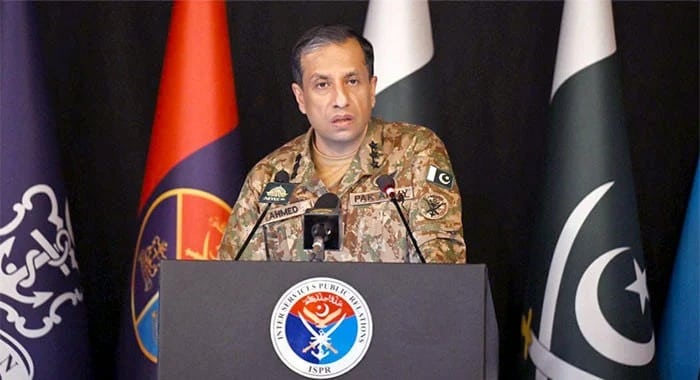Director General of Inter-Services Public Relations (DG ISPR) Lieutenant General Ahmed Sharif Chaudhry has declared that India is not only fanning the flames of regional instability but stands as the principal architect of terrorism inside Pakistan, supporting militant networks that threaten national peace and security.
In a forthright interview with an international broadcaster, the DG ISPR underscored that any attempt to understand the current tensions between Pakistan and India must begin with an honest appraisal of history. “India has persistently sponsored terrorism across the region, and particularly within Pakistan,” he stated. “Whether it is the Khawarij or separatist outfits operating in Balochistan, all evidence points to Indian patronage behind these anti-state elements.”
Read more: Kashmir Dispute Could Trigger Nuclear War Between Pakistan and India: UK Parliament Report
He strongly condemned India’s disinformation tactics following the recent Pahalgam incident, highlighting how the Indian media launched baseless accusations against Pakistan within minutes. “Even their own Ministry of External Affairs admitted days later that the investigation was still ongoing,” he noted. “Leveling accusations without evidence is not just irresponsible—it’s dangerous.”
General Chaudhry revealed that Pakistan had offered full cooperation and proposed that any evidence be handed over to an independent international forum. “We asked for facts, not fiction. But instead of choosing dialogue and transparency, India dismissed the offer and escalated hostilities, launching missile attacks on our mosques and causing the martyrdom of innocent children, women, and elderly citizens,” he said.
Reaffirming the Pakistan Armed Forces’ unwavering commitment to national defence, he asserted, “The protection of our sovereignty and borders is a sacred trust, and we have fulfilled it with resolve—and will continue to do so, regardless of the cost.” He said Pakistan responded to Indian aggression with wisdom and strength. “Our calibrated and effective military response delivered a sobering reality check to the adversary.”
Recounting the events of early May, he revealed that India initiated hostilities by firing missiles on the night of May 6 and 7. In retaliation, the Pakistan Air Force downed five Indian aircraft. “In those decisive moments, the Pakistani nation and its armed forces stood united like a fortress of steel,” he declared.
He further disclosed that India once again launched missile attacks during the night of May 9 and 10, in what he described as a failed attempt to instill fear. “India forgot one essential truth—Pakistan’s people and armed forces never surrender, and they never will.”
On the morning of May 10, Pakistan struck back with precision. “We exercised maximum restraint and professionalism, targeting only military sites. Not a single civilian installation was harmed. It was a proportionate, fair, and principled response,” he said.
According to the DG ISPR, it was the Indian Ministry of Defence itself that eventually sought a ceasefire. “We seek peace, not provocation. So we agreed—but on our terms,” he noted. He praised Pakistan’s diplomatic corps for engaging the global community with statesmanship and clarity, stressing that Pakistan is a responsible nation that prizes stability over confrontation. “Ours is a serious, peace-loving nation. Our first and enduring priority is peace,” he affirmed, adding that major powers like the United States understand and respect the unshakable spirit of the Pakistani people.
“Peace is our preference, but defence of our sovereignty is our duty—and that duty will always be fulfilled,” he concluded.





